Blog
Cloud Phone System
What Is a Business Phone Number? Everything You Need to Know

What Is a Business Phone Number? Everything You Need to Know
Read what a business phone number is, why it’s critical for every business, and the ways you can get one.
Having a dedicated phone number for your business is just as essential as having a brand logo or a company website. It gives customers a reliable, professional way to reach you while helping you maintain clear boundaries between work and personal communications. Relying on personal or dedicated mobile numbers might work in the very early days of a startup, but as your business grows, a business phone number quickly becomes a necessity.
In this article, we’ll explain what a business phone number is, why it’s critical for every business, and the ways you can get one.
What Is a Business Phone Number?
A business phone number is a dedicated line used exclusively for work communications. It serves as your company’s official point of contact, whether mentioned on your website or marketing materials, giving prospects, customers, and partners a clear, consistent way to reach your business.
Business Phone Number vs. Personal Phone Number
A personal phone number is tied to an individual and used primarily for personal communications. It usually looks like a standard mobile or landline number and is linked directly to your personal device.
In contrast, a business phone number is set up specifically for professional use. It can take different forms, such as local numbers, toll-free numbers, or vanity numbers, depending on the communication needs of your business. This separation not only ensures professionalism but also helps maintain boundaries between your work and personal life.
Landline vs Virtual Phone Number for Business Communication
When setting up business communications, companies can choose between traditional landline numbers and virtual phone numbers.
Landline phone numbers have supported businesses for decades, offering a dependable way to make and receive calls. However, in today’s mobile-first and cloud-driven world, they come with serious drawbacks. Landlines tie you to a fixed physical location, require costly infrastructure, and provide little beyond basic calling.
Virtual phone numbers, on the other hand, are not tied to a physical line or SIM card. They operate entirely over the internet, enabling calls to be made and received on smartphones, laptops, or VoIP-enabled desk phones. More importantly, virtual numbers are usually part of a cloud-based phone system that equips businesses with advanced capabilities such as call routing, omnichannel support (voice, text, WhatsApp, etc.), AI-powered tools, and integrations with CRMs and other business platforms.
Different Types of Business Phone Numbers
Beyond the technical setup, whether landline or virtual, businesses can choose from several types of phone numbers. Each serves a specific purpose and can be used alone or in combination, depending on your communication goals.
Local Phone Numbers
A local number uses a specific area code, helping your business establish trust and familiarity with customers in that region. You might have a central office in one city but purchase multiple local numbers to appeal to customers across different areas. Many organizations use this strategy to create a “local presence” even if they don’t maintain a physical office in each location.
Toll-Free Phone Numbers
Toll-free numbers allow customers to call your business without incurring charges, making them ideal for nationwide companies or customer support hotlines. These numbers typically begin with prefixes like 800, 888, 877, or 844.
International Numbers
For businesses with a global footprint, international phone numbers make it easy for overseas customers to connect without the hassle or expense of dialing internationally.
Vanity Phone Numbers
A vanity number is a custom phone number that often spells out a word or phrase using the dial pad (e.g., 1-800-FLOWERS). By being memorable and brand-aligned, vanity numbers make it easier for customers to recall your business, which can boost call volume.
Why Businesses Need a Dedicated Phone Number
Having a dedicated business phone number is no longer a “nice-to-have”. It’s a fundamental part of running a professional, trustworthy company. Here are the key reasons why every business should have one:
- Professional image: A dedicated business number instantly makes your company look more legitimate. Even if customers rarely call, simply listing a business number on your website, email signature, or marketing materials demonstrates your presence and credibility. It reassures potential customers that your business is trustworthy and reliable.
- Privacy and data protection: Using a personal phone for business means exposing your private number on websites, social platforms, marketing campaigns, and public databases. This opens the door to spam calls, robocalls, and potential privacy risks. A business phone number keeps your personal life separate and protects you from unnecessary intrusions.
- Customer accessibility: Customers feel more confident doing business with a company they can reach directly. Displaying a business number tells them support is just a call away, especially during business hours. It builds trust by assuring customers they won’t be left searching for ways to contact you if something goes wrong.
- Organized business communication: Modern business phone systems, especially virtual ones, go far beyond basic calling. They centralize all customer calls in one place, making them easy to track, manage, and review. Advanced features like call routing and auto-attendants ensure calls reach the right person quickly. Plus, team collaboration tools allow colleagues to have access to a shared list of customer communications.
- Work-life balance: A dedicated business phone number helps you create clear boundaries between work and personal life, especially important for startup founders and small business owners who are often deeply involved in every customer interaction. This separation reduces burnout and allows you to maintain a healthier, more sustainable relationship with your business.
Who Should Get a Business Phone Number
The short answer: every business should have a dedicated business phone number. No matter the size of your company or the industry you operate in, having a professional phone number ensures smoother communication.
Solopreneurs
Even if you’re running the show alone, using a business number instead of your personal cell makes you look more professional. It shows customers and partners that you take your work seriously, and it keeps your personal life separate from business communications.
Startups
For startups, first impressions matter. A dedicated phone number gives your brand legitimacy from day one and reassures investors, partners, and early customers that your business is real. Startups often operate remotely or without a physical office, so a business number also helps them create a consistent point of contact regardless of location.
Small Businesses
Small businesses rely heavily on customer satisfaction and repeat business. A dedicated business phone number ensures you have a reliable line to handle a growing volume of calls, stay responsive, and never miss important opportunities to connect with customers.
Medium and Large Organizations
For medium and large businesses, having a business phone number is a given. The challenge lies in scaling and optimizing how it’s used. As call volumes grow and teams spread across multiple departments or locations, companies need more than just a line to answer calls.
How to Get a Business Phone Number
Getting a business phone number is a straightforward process, but choosing the right type and provider requires some planning. Here are the key steps:
- Identify your needs and budget: Start by assessing how your business communicates. How many calls do you expect to handle? Do you need multiple lines for departments or team members? And how much budget can you allocate? Answering these questions upfront helps you avoid paying for features you don’t need or ending up with a service that can’t keep up with your growth.
- Choose between landline and virtual numbers: Decide whether a traditional landline or a virtual phone number makes the most sense for your business. Landlines provide reliability but tie you to a fixed location. Virtual numbers, on the other hand, offer flexibility, scalability, and advanced features that are often better suited for modern businesses.
- Pick the right provider: Selecting the right business phone number provider is one of the most important steps. Consider whether you simply need a phone line for calls or would benefit from a business phone system that adds call routing, voicemail, analytics, and integrations with your existing tools. The latter often delivers far more value.
Once you’ve defined your needs, compare providers on features, pricing, customer support, and scalability. Choose one that can grow with your business to avoid switching providers every time your call volume grows.
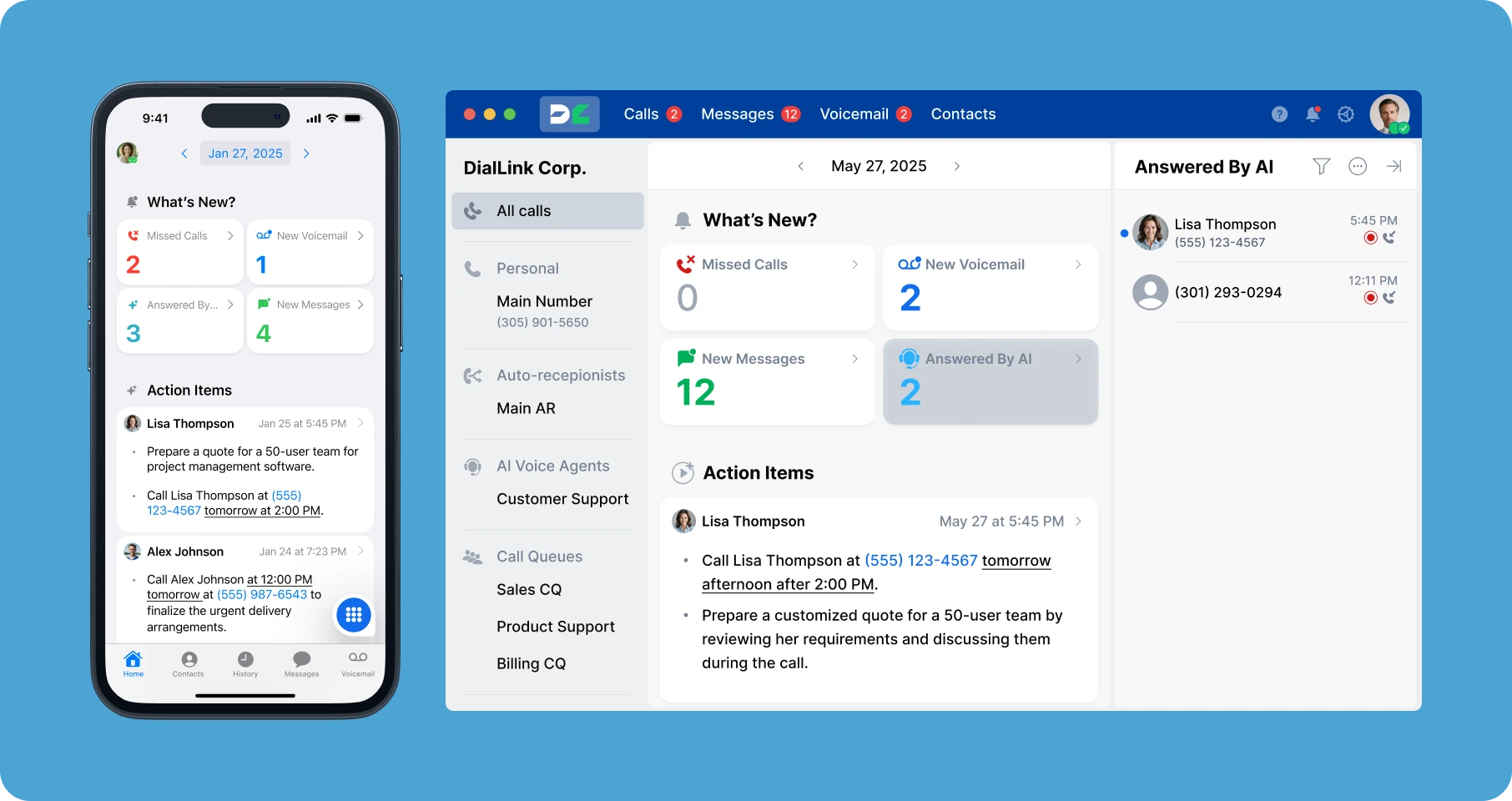
- Set up your account and select your phone number(s): Once you’ve chosen a provider, you’ll set up your account and select your business phone number or multiple numbers if needed. Depending on your goals, you might choose a local number for community presence, a toll-free number for nationwide accessibility, or even a vanity number for brand recall.
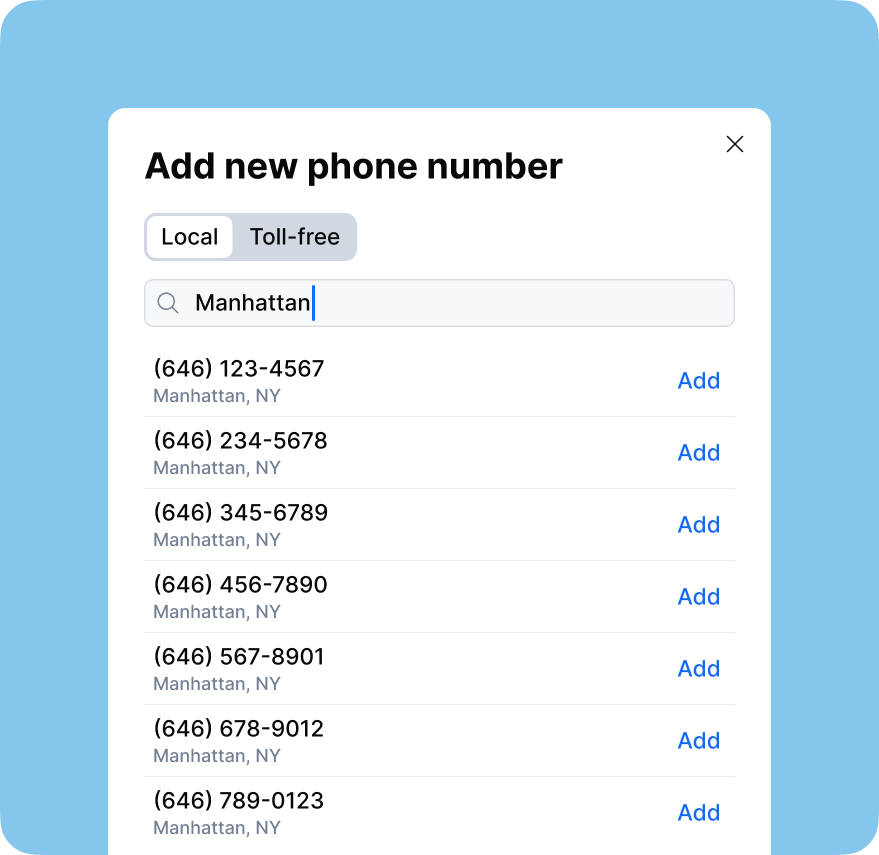
- Publish and share your business phone number: Finally, make your new business phone number visible. Post it on your website, social media profiles, email signatures, business cards, and marketing materials. The easier customers can find your number, the faster you’ll start seeing it ring.
Key Features You Get with Business Phone System
The real advantage of getting a virtual business phone number through a cloud-based business phone system is that it doesn’t just stop at making and receiving calls. Instead, your number comes packed with an impressive set of features.
Here are some of the key features you can expect:
Multi-Device Access
With a virtual business number, you’re not tied to one device. Use it on a traditional desk phone, smartphone, laptop, or desktop computer. This flexibility means you can make and receive calls whether you’re in the office, working remotely, or on the road.
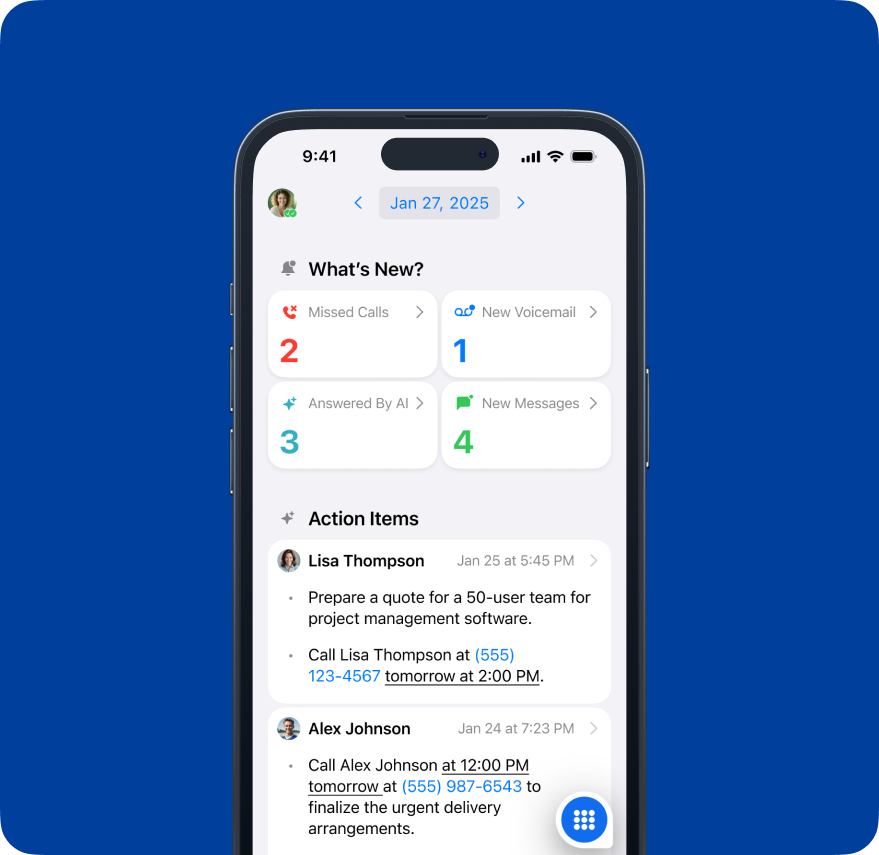
Custom Greetings
Complete your business presence by adding professional, branded greetings that welcome customers and provide important information upfront.
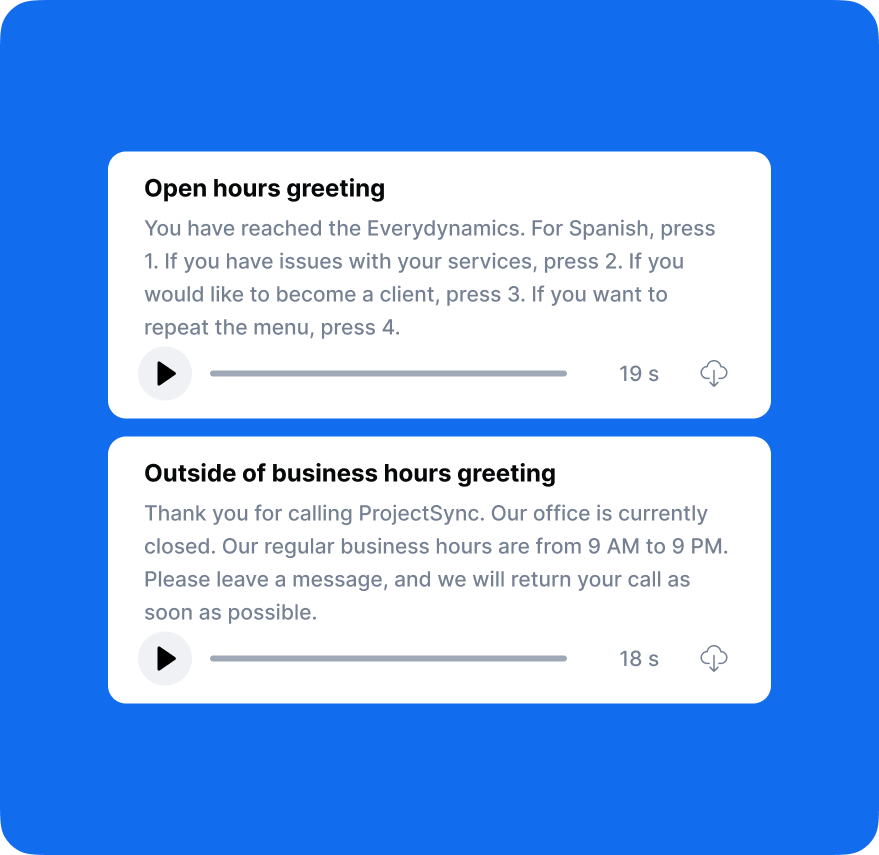
Voicemails
Customers and partners can leave messages when you’re unavailable, but the real benefit is how easily you can manage them. Modern business phone systems include voicemail management and AI-powered transcriptions, letting you instantly read messages without having to listen to every recording.
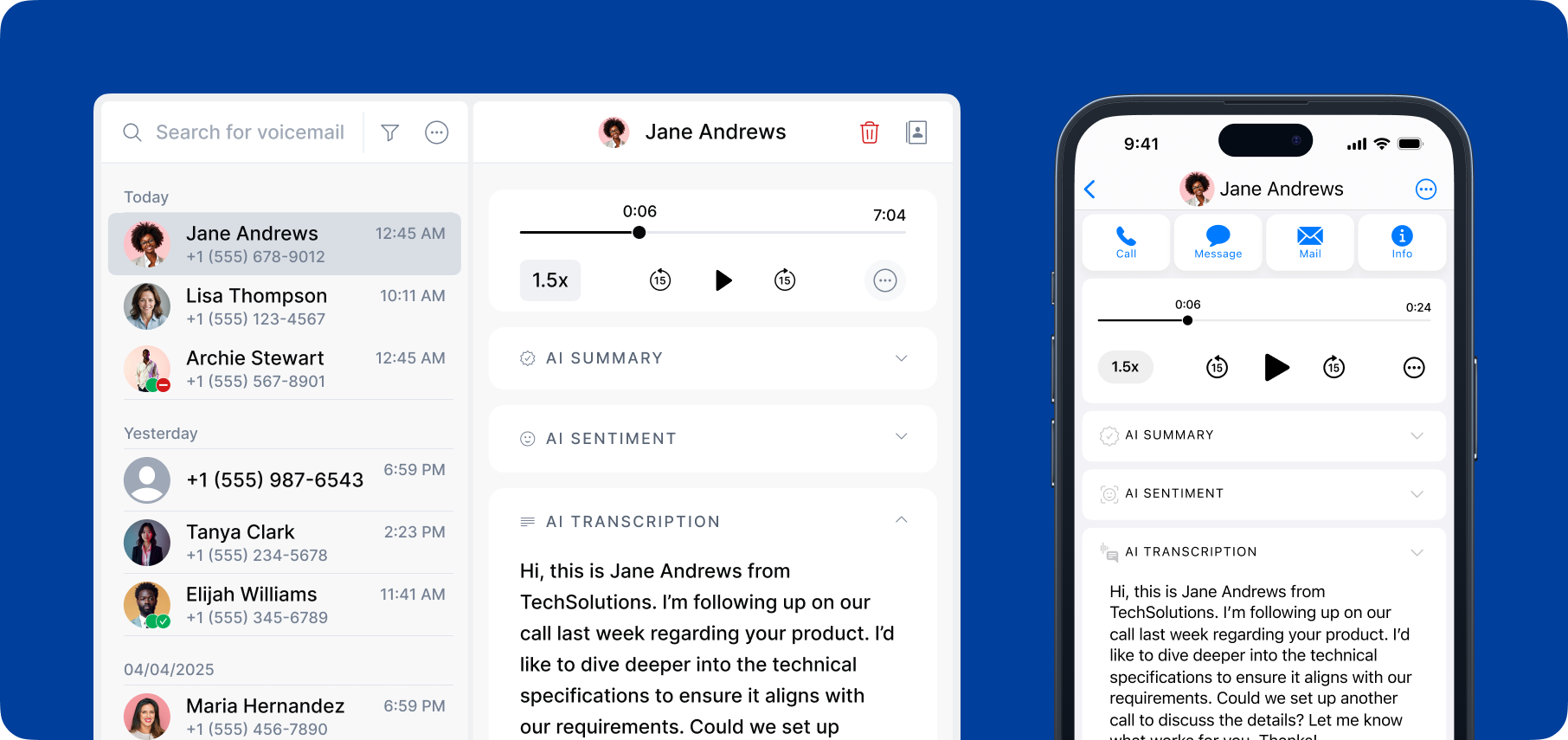
Business Call Management and Routing
Cloud-based phone systems give you a complete toolkit to manage call flows efficiently:
- Custom business hours: Set when your lines are open and route calls accordingly: answer during business hours, then automatically forward to voicemail after hours.
- Call forwarding: Redirect calls to an alternative number based on different conditions, such as time of day, when a line is busy, or if no one answers after a set number of rings.
- IVR with auto-attendant: Use an interactive menu to guide callers through available options and route them to the right department or person without human intervention.
- Call queues: Place callers in a queue with announcements or music until the next available agent can assist them.
- Ring groups: Distribute calls across a team so the next available member can pick up quickly.
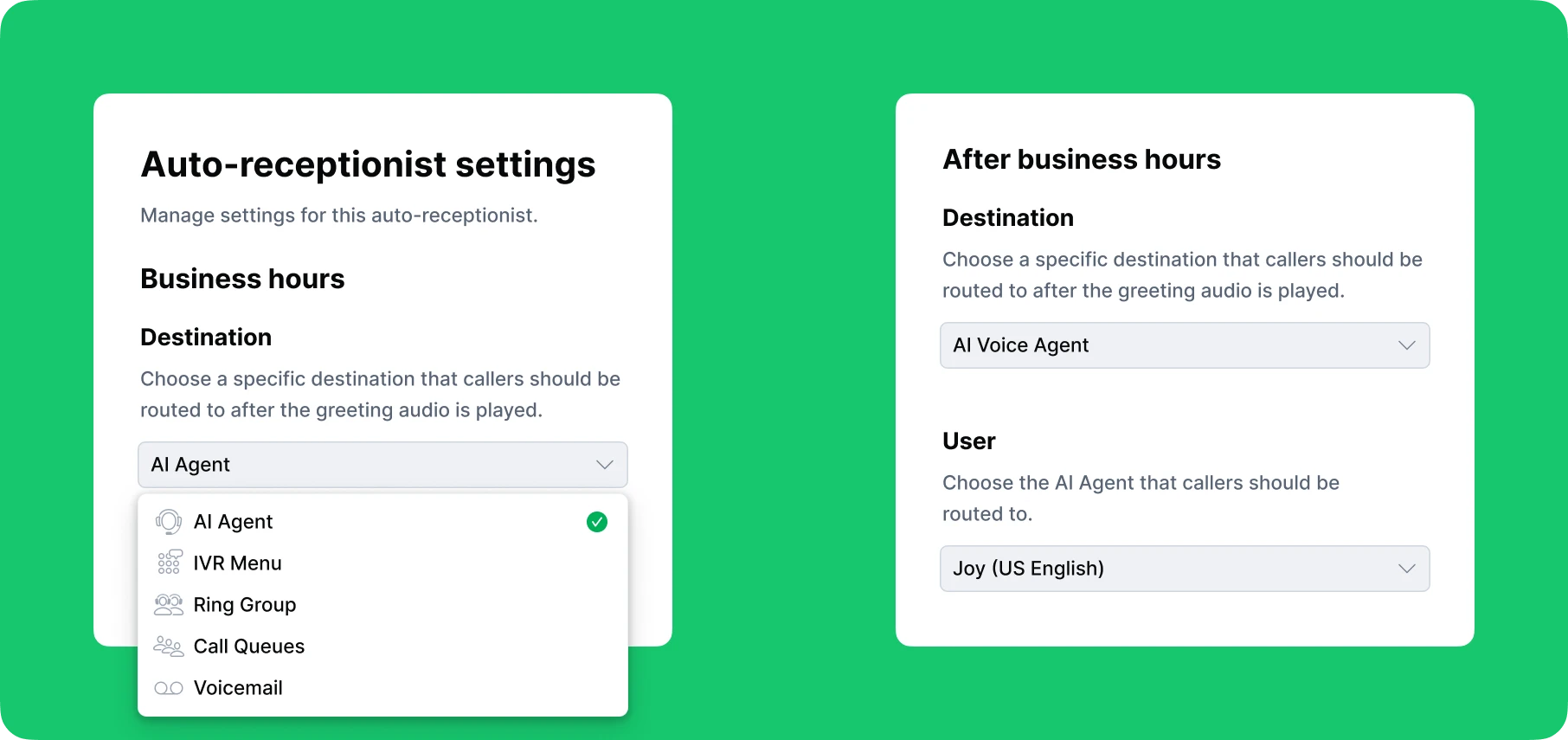
Automatic Call Recordings
Record calls for training, compliance, and quality assurance. Modern systems go a step further by adding AI-powered transcriptions, summaries, sentiment analysis, and action items, helping you save time on reviews and ensuring more accurate, efficient follow-ups.
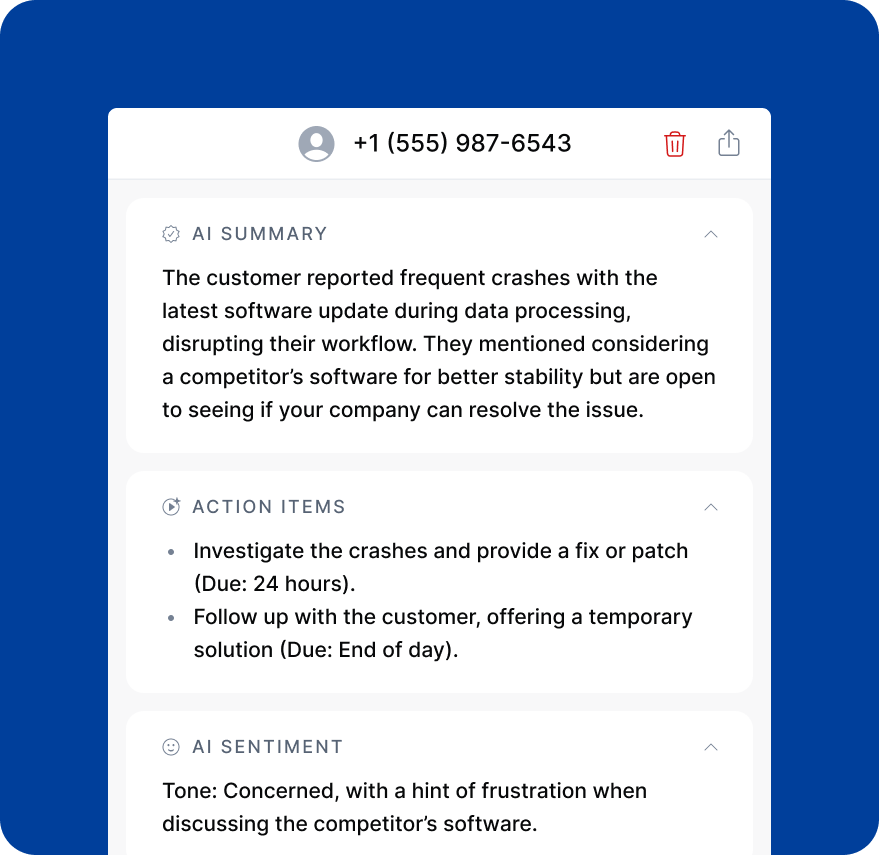
Business Messaging
Modern business phone systems extend beyond voice to include multiple messaging channels such as SMS, RCS, and WhatsApp. You can send and receive messages from the same platform you use for calls, keeping every customer interaction organized in one place.
Learn more about business phone systems and how they can benefit your business.
Conclusion: Get Your Business Phone Number with DialLink
Having a dedicated business phone number is essential for companies of all sizes. While startups and small business owners may feel that using a personal number is “good enough” for handling communications, this approach quickly creates problems. Customers should never have to struggle to reach you—or end up dialing your personal line just to get in touch.
With DialLink’s business phone system, you can choose from local, toll-free, and international phone numbers — all managed from one platform. Every number comes with powerful features like advanced call management, business messaging, team collaboration, AI voice agents, and more.
Best of all, you don’t need IT support to set it up or manage it. DialLink makes administration simple with an intuitive interface designed for startups and small businesses, so you can stay focused on growing your company instead of worrying about technology.
A business phone number is a dedicated number used exclusively for work communications. Unlike a personal number, it represents your company in a professional way and provides customers, partners, and prospects with a reliable and consistent way to reach you. Business phone numbers can be local, toll-free, international, or even vanity numbers, depending on your needs.
Some providers offer free business phone numbers as part of basic plans or trials. However, these usually come with restrictions such as limited minutes or low call quality. If you are looking for a more professional call experience, investing in a paid plan from a reliable business phone system is recommended.
Yes, you can use a business phone system like DialLink to access your business number on your mobile phone.
Absolutely. With DialLink’s business phone system, you can easily keep your existing business phone number through a simple, automated number porting.
Yes. Many modern business phone systems like DialLink support SMS, MMS, RCS, and even WhatsApp messaging using your business phone number. This allows you to handle calls and messages from the same platform, keeping all communications consistent and organized.
Featured Tags
Share
In this article

Arina Khoziainova
Content Writer at DialLink
Arina is a content writer with over 7 years of experience in the IT industry. At DialLink, she creates clear, insightful content that helps small business and startup owners simplify communication and drive growth using modern tools. With a strong focus on practical value, Arina transforms complex topics into accessible, actionable stories.
Keep Reading

Virtual Local Phone Numbers: Overview and Benefits
Explore everything you need to know about virtual local phone numbers to help you choose the right one for your business.

Local Vanity Phone Numbers for Business: What They Are and How to Get One
Read about what a vanity local phone number is, how businesses use them, and how to get one for your company.

The Ultimate Guide to Local Phone Numbers for Business
Explore what local phone numbers are and how your business can easily get one.

How to Get a US Toll-Free Number for Your Business
Discover how to get your US toll-free number the easy and affordable way.

Number Porting Explained: Everything Your Business Must Know
Learn what number porting is, how it works, and how to prepare for it to ensure a smooth and hassle-free transition to your new phone provider.

What Is an International Phone Number and How to Get One?
Learn what an international phone number is, see examples from major cities worldwide, and discover why having one can be essential for your business.

What Is a Toll-Free Phone Number and Why Your Small Business Should Have One
Find out what a toll-free number is, the costs associated with it, and how to get a toll-free phone number for your business.

What Is a VoIP Number and How Does It Work?
Explore what VoIP numbers are, how they differ from landline and mobile phone numbers, and who can benefit from using them.